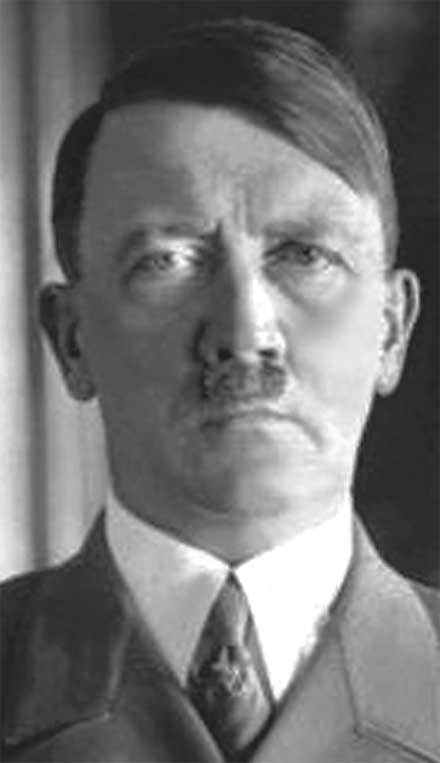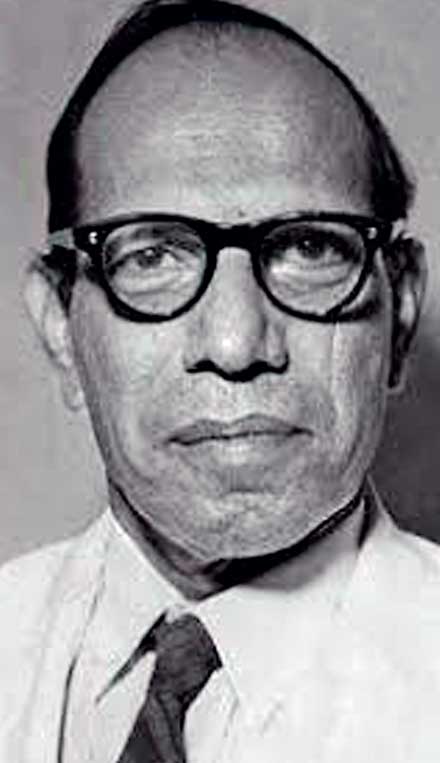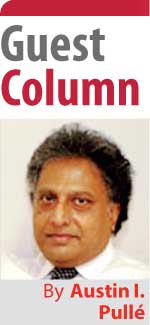Saturday Feb 14, 2026
Saturday Feb 14, 2026
Wednesday, 26 January 2022 01:54 - - {{hitsCtrl.values.hits}}

Adolf Hitler

William Gopallawa
|
 The pack of feral Neanderthals who shredded Priyantha Kumara, the august personages who encourage politicians to emulate Hitler, the cleric who suggests that the Government should be handed over to the military for 10 years, and even those who argue for the continuation of the executive presidency, albeit with reduced powers, all share the type of thinking which Daniel Kahneman calls System 1 thinking or Fast Thinking.The Nobel Prize winner in his book, “Thinking – Fast and Slow”, identifies two types of thinking. Our limbic or reptilian brain, the evolutionary mechanism for self-preservation when split-second decision-making is required, drives Thinking Fast. However, for more complicated matters, Kahneman argues that use of System I thinking will lead to awful results. When complex issues are involved, slow deliberate thinking which is a feature of System II thinking is mandatory.
The pack of feral Neanderthals who shredded Priyantha Kumara, the august personages who encourage politicians to emulate Hitler, the cleric who suggests that the Government should be handed over to the military for 10 years, and even those who argue for the continuation of the executive presidency, albeit with reduced powers, all share the type of thinking which Daniel Kahneman calls System 1 thinking or Fast Thinking.The Nobel Prize winner in his book, “Thinking – Fast and Slow”, identifies two types of thinking. Our limbic or reptilian brain, the evolutionary mechanism for self-preservation when split-second decision-making is required, drives Thinking Fast. However, for more complicated matters, Kahneman argues that use of System I thinking will lead to awful results. When complex issues are involved, slow deliberate thinking which is a feature of System II thinking is mandatory.
For Sri Lankans battered by the abuses of power, there are few more complex and existential issues than the survival and protection of the inalienable sovereignty of the People affirmed in Article 3 of the Constitution. Unpacked, Article 3 connotes individual freedom and human dignity as the most important attributes of a sovereign people. A constitution that supports the realisation of such sovereignty, using for example, a template like Maslow’s hierarchy of needs, should replace the existing one which is a playbook for dictators.
Constitutional provisions that imperil the inalienable sovereignty of the People by substituting an executive wielding imperial and unaccountable powers are mutually contradictory. American jurisprudence has developed the concept of “strict scrutiny” and the European courts, as well as the UK Supreme Court, has adopted a “proportionality” jurisprudence. Imported into the Sri Lankan context, any amendment that adds more power to the executive president that tends to give the servant more powers over the master will be unconstitutional unless justified by manifestly compelling reasons, a high bar.
Where additional powers are sought, they must be proportional to the objectives sought to be achieved. Articles 3 and 4 imply inherent limitations on powers that can be exercised by any branch of Government. If these articles had been properly interpreted, the Supreme Court would not have greenlighted the 20th Amendment which smashed the already fragile guardrails that protected the inalienable sovereignty of the People and elevated an executive president to the status of a pharaoh.
Only a reversion to a titular head of state constitutional arrangement that prevailed under the first and second constitutions can give effect to Article 3 and at the same time derail the project of ethno-religious entrepreneurs who want to reap the fruits of the current polarisation of Sri Lankan society which is based on identity rather than morals and justice and turn the country into a medieval theocracy.
The belief that the ills of the country can be cured and the security of the country better protected by a strong presidency is a reflexive System 1 response that does not survive a System 2 analysis. A System 2 review requires an honest recognition of the abuses of power by multiple executive presidents. Several executive presidents have made a mockery of Article 3 and subverted the separation of powers entrenched in Article 4.
The manifestly illegal act of extorting undated letters of resignation from all MPs, including a future president and political heavyweights, of a ruling party, destroying the professionalism and neutrality of the administrative service and the police, appointing astrologers, unable to predict how the US Federal Reserve will set rates, to director boards in banks, engaging in brand dilution of universities by unsuitable chancellor appointments, state sanctioned abductions and murders, mocking the rule of law by ignoring the actions of the state minister for prisons but harassing a brave whistleblower of a garlic scam are just a few of the many examples of the egregious abuses of an executive presidency.
By their fruits, you shall know them
Dubious distinctions such as holding the record second place in the world for enforced disappearances, junk rating for sovereign bonds, and the country’s shameful rankings in the Corruptions Perception Index can likewise be linked to the abuse of powers of an executive presidency. “By their fruits, you shall know them” is a millennia old piece of wisdom. The poisonous fruits of the executive presidency orchard should be evident to all but the blind.
Pogo’s observation that, “We have met the enemy and he is us”, explains to a large extent why a large segment of Sri Lankan society is unable to reconcile itself to the idea the executive president is not a supreme monarch but a temporary manager, a servant and custodian, whose master is the People as affirmed in Article 3.
In “Accidental Gods: On Men Unwittingly Turned Divine”, Anna Subin relates the story of John Nicholson who was a particularly brutal deputy commissioner of Rawalpindi. He was an unspeakably brutal man who kept a severed human head on his desk. Despite this, he inspired a cult of thousands of Indians who surrounded him chanting prayers and treating him as a god. Unlike Pakistan and Bangladesh, where Islam forbids adherents from self-abashing themselves by prostrating themselves before gurus, clerics and officials, the culture in Sri Lanka and India support and encourage such self-abasement nourished by practices of third world honorifics such as “His Excellency” and “Your Lordship”.
An executive president benefits from this cultural factor that bestows a semi-divine status. Such status is evidence so often by images of Government officials, including the oleaginous trade union doctor and the head of a road authority, prostrating themselves like unmanumitted slaves before presidents who make no effort to forbid this degrading self-abasement. Hopefully, someday, a fundamental rights petition will succeed in getting a blanket injunction against officials, paid for by the public purse, from disgracing their office and the People they are meant to serve by such servile conduct.
A vivid example of System 1 thinking is the exhortation by a senior cleric to a politician to behave like Hitler. Hitler is notorious for many reasons but the most infamous is his reputation for engaging in murder on an industrial scale of a minority scapegoated for the ills of Germany. Ominously, in a society awash with religious programs, no politician, religious leader, or national figure dared to rebuke this glorification of Hitler. The moral squalor of the land was exposed when it was left to the German ambassador to tweet that Hitler is no role model.
In her well-received book, “How Civil Wars Start: And How to Stop Them,” Professor Barbara Walter of the University of California, San Diego coins the word “anocracy”. Anocracies are societies in-between a democracy and an autocracy. A parliament and holding elections are features of a democracy. But police who try to import the Thai crime of “lese majaste” and create a new offence of criminal defamation of the president ignoring the specific language of the fundamental rights chapter, a perception by the President that it was within his power to order the army to strangle the farmers who feed the nation and compel them to use organic fertiliser, and the assertion that any verbal direction he may give must be treated as if it has the force of a Government circular are features of an autocracy.
On the other hand, a titular head of state will bring equilibrium and balance power with responsibility. In such a system, the prime minister is not a god but primus inter partes, and will be vulnerable to loss of party support and a no-confidence motion. A titular head of state who will also be the commander in chief of the armed forces will dissolve the present symbiotic relationship between the president and the armed forces, whom the former thinks is meant to be his personal praetorian guard. A ceremonial president would never declare that his verbal instructions have the force of a circulars. A ceremonial president would never displace civilian Government servants who are trained in public administration with military personnel untrained to perform civilian functions. A ceremonial president would insist that the armed forces are personnel who are both officers as well as gentlemen.
The abuse of the pardoning power vividly illustrates dangers of the executive presidency. Under the Soulbury constitution and the first republican constitution, the pardoning power was vested in the head of state. Vesting the pardoning power in an executive president is an invitation to abuse, an invitation that has been accepted with much enthusiasm by many executive presidents. In effect, a penumbra of immunity is created because well-connected cronies could murder and pillage at will knowing that even in the unlikely event of their being convicted, a pardon will be forthcoming.
A ceremonial president will prevent pardons being granted for political reasons. The first executive president not only pardoned a brutal rapist and thug but elevated him to a high position in the party and made him a Justice of Peace. His successors pardoned convicted murderers including a valiant soldier who slit the throat of a five-year-old child. Article 34 of the Constitution mandates certain conditions that must be satisfied before a pardon can be granted for convicted murderers.
These require a report by the trial judge who presided over the murder trial, a report that should be forwarded to the Attorney-General, whose advice is then forwarded to the Minister of Justice, who in turn forwards a recommendation to the President. Even the credulous would not believe that these procedures had been followed. Although many, both inside and outside Parliament, deplored the pardons of these convicted murderers, no parliamentarian thought it fit to ask the Minister of Justice to confirm that there had been a scrupulous compliance with Article 34.
|
Time to put an end to the claim
Exhibit I of those who support the continuation of the executive presidency is the war victory which they attribute to the presidential powers enjoyed by Mahinda Rajapaksa. It is time to put an end to this claim. When the tubby mass murderer donned camos and converted his band into a conventional army, the war was Sri Lanka’s to lose. And lose it would have had not Rajapaksa been in charge. And it would have won the war even if Rajapaksa was a prime minister serving under a titular head of state because he made the right decisions.
The first decision paving the way to victory was based on his belief that the LTTE could be defeated by military means. His rivals meanwhile gave aid and comfort to the enemy, possibly strengthening the latter’s recruitment drive and demoralising the forces, by proclaiming that the LTTE could never be defeated militarily. The second was his decision to properly resource the armed forces. When the tubby mass murderer donned his camos, he seemed unaware of General Omar Bradley’s observation that while amateurs talk of strategy, professionals talk of logistics. The commanders focused on logistics while the deranged psycho continued with his cyanide capsule and suicide bombings strategy.
Finally, and this was the most decisive, Rajapaksa’s decision to ignore the demands of foreign officials like Miliband and Kouchner to pause the final attack made victory a foregone conclusion. His rivals, so in thrall to the Solheims of the world, would have caved into the barely disguised threats of foreign officials.
At a semi-final soccer game between England and Germany, watched by Thatcher and Helmut Kohl, where England was defeated, the Chancellor told the Prime Minister that Germany had defeated England at her own game to which the Iron Lady retorted that England had defeated Germany twice at its own game in the 20th century. The UK was able to defeat Germany (with the assistance of the Red Army and the Americans) with a prime
minister.
Winston Churchill, whether as Prime Minister or President, would have led Britain’s fight against the Third Reich. Hitler was a dictator with absolute powers but his formidable Wehrmacht was vanquished and his mates ended up in Nuremberg on their way to the gallows. It is character and not an array of powers which ultimately determines whether wars will be lost or won.
In the area of foreign relations, the greatest triumphs occurred under a Westminster style Government and the greatest humiliation under an executive presidency. The greatest foreign policy triumphs, the recognition of the country’s sovereignty over Katchatheevu island, bolstered by the fact that the island fell within the jurisdiction of the Catholic diocese of Jaffna and the Sirima-Shastri Accord, without with Sri Lanka would currently hold the record for the most number of stateless people in the world, were done when the chief executive was the prime minister. The greatest foreign policy debacles which was the invasion of sovereign airspace and the Indo-Lanka Accord which gave India a say in constitutional affairs took place during the powerful executive presidency.
It is ironical that a stronger executive presidency was thought necessary after the Easter bombings. If at all the Easter bombings provide a strong reason to abolish a semi-presidential system and revert to the Westminster model. If a simple British constable had been forewarned of a plan to bomb the Ariana Grande Manchester concert in 2017, the suicide bombing would have been averted. But a politicised national defence group staffed with careerists and incompetents ignored not one but several warnings about the impending Easter attacks. The bombings killed hundreds and maimed many more all despite the multiple warnings. The tragedy could have been avoided with simple police cooperation with intelligence operatives but not with a politicised police force where changes of Government see the CID chief arrested and a senior police officer fleeing the country.
Executive presidency is a toxic dump
William Gopallawa was an embodiment of all that was dignified, decent, and honourable in Sri Lanka. He is an example of the type of moral leader that the country desperately needs. The executive presidency, even without the 20th Amendment, is a toxic dump that has been poisoning democracy and making a mockery of Article 3 that proclaims the inalienable sovereignty of the People. Invited to clean this Augean Stable that is the country’s political system, even Hercules would send in his retirement papers. This toxic landfill and a vibrant democracy cannot co-exist.
To centre the pieces on the board where Article 3 sovereignty is more than a meaningless set of words, the People need to replace the Hitler model with a William Gopallawa model. Gopallawa would not have been a head of state who would lecture a gathering of UN dignitaries on behalf of the Japanese people that hatred does not cease by hatred but by love and then forget to remind the country of this fundamental Buddhist truth during the Indian partition type butchery of his own people in July 1983. Decency, dignity, and honour must be invited back to the seats of Government.
(The writer graduated from the Faculty of Law, University of Colombo. He practiced cross border transactions law in the Asia Pacific region before teaching law at the Singapore Management University for 20 years before retirement.)